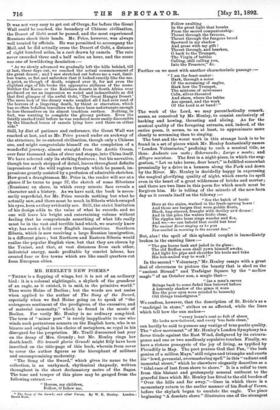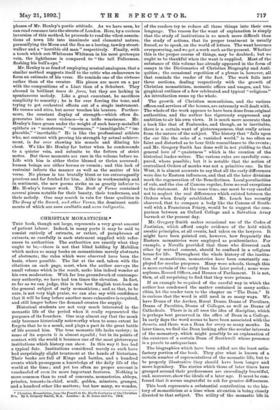MR. HENLEY'S NEW POEMS.*
"THERE is a flapping of wings, but it is not of an ordinary bird : it is a colossal nightingale, a skylark of the grandeur of an eagle, as it existed, it is said, in the primitive world." Thus wrote Heine of Berlioz ; but the words are not amiss when applied to the author of The Song of the Sword, especially when we find Heine going on to speak of "the outrageous sentiment of the prodigious, of the exoessive, and of material immensity," which he found in the music of Berlioz. For verily Mr. Henley is no ordinary song-bird. The term of "minor poet" is surely inapplicable to one who winds such portentous sennets on the English horn, who is so bizarre and original in his choice of metaphors, so regal in his disregard for the proprieties. Mr. Trail discoursed last year on the decay of Mrs. Grundy ; but Mr. Henley rings her death-knell. Sic transit gloria Grundi might fitly have been inscribed on the title-page of this book, wherein from cover to cover the author figures as the hierOphant of militant and uncompromising modernity.
"The Song of the Sword," which gives its name to the collection, is an unrhymed, rhythmical rhapsody, written throughout in the short declamatory metre of the Sagas. The tone and temper of this piece may be ganged from the following extract :— " Heroes, my children,
Follow, 0 follow me,
• The Song of the Sword; and other Verses. By W. E. Henley. London : David Hatt.
Follow exulting In the great light that breaks From the sacred companionship : Thrust through the fatuous, Thrust through the fungous brood Spawned in my shadow And gross with my gift !
Thrust through, and hearken, 0 hark to the Trumpet, The Virgin of battles Calling, still calling you, Into the Presence," &c.
Further on we meet with another characteristic passage :— "I am the feast-maker : Hark, through a noise
Of the screaming of eagles, Hark how the Trumpet, The mistress of mistresses Calls, silver-throated And stern, where the tables Are spread, and the work Of the Lord is at hand ! "
The work of the Lord, we may parenthetically remark, seems, as conceived by Mr. Henley, to consist exclusively of hacking and hewing, thrusting and slicing. As for the musical quality of the foregoing extracts, and, indeed, of the entire poem, it seems, to us at least, to approximate more closely to screaming than to singing. The best and the worst work in this strange book is to be
found in a set of pieces which Mr. Henley fantastically names " London Voluntaries," prefixing to each a musical title, as thus: Andante con moto ; Scherzando ; Largo e meats; and Allegro ?wisdom The first is a night-piece, in which the sug- gestion, "Let us take horse, dear heart," is fulfilled somewhat
prosaically by a drive in a hansom along the Park and down by the River. Mr. Henley is decidedly happy in expressing the magical glorifying quality of night, which exerts its spell even in the heart of a great wilderness of bricks and mortar; and there are two lines in this poem for which much must be forgiven him. He is telling of the miracle of the new-born day as it reveals itself on the tideway :—
" See the batch of boats
Here at the stairs, washed in the fresh-sprung beam !
And those are barges that were goblin floats, Black, hag-steered, fraught with devilry ard dream ! And in the piles the waters frolic clear, The ripples into loose rings wander and flee,
And we—we can behold that could but hear
The ancient River singing as he goes New-mailed in morning to the ancient Sea."
But, alas ! the spell of this splendid couplet is immediately broken in the ensuing lines :—
" The gas burns lank and jaded in its glass : The old Ruffian soon shall yawn himself awake, And light his pipe and shoulder his tools and take His hob-nailed way to work ! "
In the second " Voluntary," Mr. Henley essays with a great deal of cleverness to picture the beauty that is shed on the "ancient Strand" and Trafalgar Square by the "mellow magic" of an October sun, a magic that-
" (as a man's caress Brings back to some faded face beloved before A heavenly shadow of the grace it wore Ere the poor eyes were minded to beseech) Old things transfigures."
We confess, however, that the description of St. Bride's as a "madrigal in stone," strikes us as affected, while the lines which tell how the sun makes— "every horse's coat so full of sheen He looks new-tailored, and every 'bus feels clean," can hardly be said to possess any vestige of true poetic quality. The "slow movement" of Mr. Henley's London Symphony is a fierce tirade against the East Wind, disfigured by its extrava- gance and one or two needlessly repulsive touches. Finally, we have a riotous panegyric of the joy of living, as typified by Piccadilly in May. The poet praises God that Pan, "the lash genius of a million Mays," still reigns and triumphs and exerts his "lewd, perennial, overmastering spell" in this "radiant and immortal street," which he elsewhere elegantly describes as a "tidal-race of lust from shore to shore." It is a relief to turn from this blatant and grotesquely sensual outburst to the graceful lines which Mr. Henley has fitted to the old burden of "Over the hills and far away,"—lines in which there is a momentary return to the earlier manner of his Book of Verses, before the skylark began to emulate the eagle. The piece beginning "A desolate shore" illustrates one of the strangest
phases of Mr. Henley's poetic attitude. As we have seen, he can read romance into the streets of London. Here, by a curious inversion of this method, be proceeds to read the vilest associa- tions of town life into inanimate and elemental nature, personifying the Moon and the Sea as a leering, tawdry street- walker and a "horrible old man" respectively. Finally, with a touch which out-Whitmans Whitman in his most grotesque vein, the lighthouse is compared to "the tall Policeman, flashing his bull's-eye."
Mr. Henley is so fond of employing musical analogues, that a similar method suggests itself to the critic who endeavours to form an estimate of his verse. He reminds one of the virtuoso rather than of the creator. His pieces are more on a par with the compositions of a Liszt than of a Schubert. They abound in brilliant tours de force, but they are lacking in spontaneous melody. Like a great executant, he sacrifices simplicity to sonority ; he is for ever forcing the tone, and trying to get orchestral effects out of a single instrument. He rouses and stirs, but never touches his hearers. Further- more, the constant display of strength—which often de- generates into mere violence—is a trifle wearisome. Mr. Henley's lines groan under the weight of such heavy-metalled epithets as "monstrous," "enormous," "immitigable," "im- placable," "inevitable." He is like the professional athlete who, not content with proving his strength by actual achieve- ment, is for ever showing his muscle and dilating his chest. We like Mr. Henley far better when he condescends to a quieter vein, and submits to the fetters of strict metre. But these moments are rare in the volume before us. Life with him is either thrice blessed or thrice accursed ; human beings are either heroes or vermin; and this lack of restraint infects the manner as well as the matter of his verse. No phrase is too brutally blunt or too extravagantly precious and far fetched for him. Alike in workmanship and in sentiment, the new poems strike us as greatly inferior to Mr. Henley's former work. The Book of Verses contained several pieces notable for their beauty, their tenderness, and their melody. One may search in vain for these qualities in The Song of the Sword, and other Verses, the dominant senti- ments of which are sava exultatio and smva indignatio.



































 Previous page
Previous page